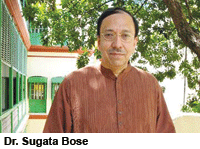Ever since chief minister Mamata Banerjee announced a team of alumni to chalk out a plan for the resuscitation and revival of West Bengal’s showpiece Presidency University (PU, estb. 1817) shortly after she ousted the Communist Party of India-Marxist (CPM)-led Left Front government which had ruled the state for 34 years in the historic assembly election of May 2011, the future of the institution has been the buzz of the academic community in Kolkata.
 Banerjee’s dream is to transform the university — which suffered a steep fall in reputation during Communist rule — into a centre of excellence. To attain this goal, a ten-member Presidency Mentor Group (PMG), chaired by Harvard professor Sugata Bose and economist Isher Judge Ahluwalia, submitted its first report in August last year stressing the importance of recruiting top-class faculty through a search committee.
Banerjee’s dream is to transform the university — which suffered a steep fall in reputation during Communist rule — into a centre of excellence. To attain this goal, a ten-member Presidency Mentor Group (PMG), chaired by Harvard professor Sugata Bose and economist Isher Judge Ahluwalia, submitted its first report in August last year stressing the importance of recruiting top-class faculty through a search committee.
The PMG’s second report submitted in February has been given final shape after considerable debate. It charts out a development and upgradation trajectory for the 194-year-old varsity. According to Bose, the report draws a road map for transformation of PU into a “global model after making suitable changes”.
The mentors have recommended “holistic education” for first-year undergraduate students by eliminating the difference between honours and pass subjects. “The rationale is to enable students to gain an overview of undergraduate courses before opting for specialisation,” Bose told the media. Students will be admitted into streams such as physical sciences, biological sciences, mathematical sciences, social sciences and humanities, and will choose their honours specialisations at the end of the first year.
According to Bose, gaining a working familiarity of subjects studied in the first year will help students choose their major. “Several bright students suffer because of a wrong choice of subject in the first year. The introduction of the proposed model will address this problem,” he says.
Citing the example of US universities such as Harvard, Yale and Princeton where a four-year bachelor’s programme is followed and students opt for specialisation at the end of the second year, Bose observed: “Since the four-year bachelor’s programme does not exist in India, we have recomm-ended specialisation at the end of first year.”
All PMG members believe the new model will be easier to implement if the duration of undergraduate courses can be gradually extended from three to four years. The Centre, too, has recently proposed the introduction of a four-year undergraduate programme. “Presidency can be a trailblazer in pursuing a 12 plus 4 (bachelor’s) programme,” says the report, which endorses a “world-class syllabus” for American-style schools of postgrad and doctoral studies — in economics, English, history, life science, physics and statistics. The Presidency University Council will discuss this model in its next meeting scheduled for July. The “whole plan” can be put into practice in the session beginning July 2013, says the report.
But while there’s a flurry of activity in pu and its ten-member PMG, the Trinamool Congress government’s Budget 2012-13 presented to the legislative assembly by finance minister Amit Mitra on March 23, made no specific allocation to fund the proposed makeover. While he made a passing reference to Presidency and of the need to “transform the university into a world-class centre of research and excellence,” he announced an allocation of Rs.240 crore for higher education as a whole. Therefore it’s very doubtful given that West Bengal hosts 18 universities and 374 colleges, that Presidency University will receive anywhere near the amount of Rs.200 crore recommended by the PMG’s second report.
Quite clearly, chief minister Mamata Banerjee isn’t ready to back her dreams for Presidency University with hard cash.
Baishali Mukherjee (Kolkata)


























